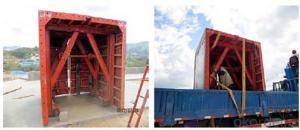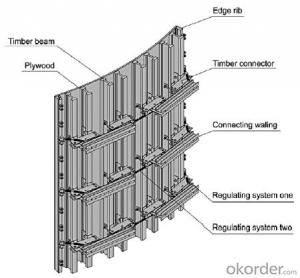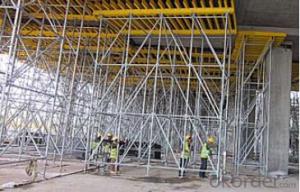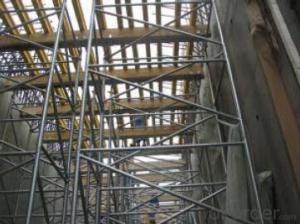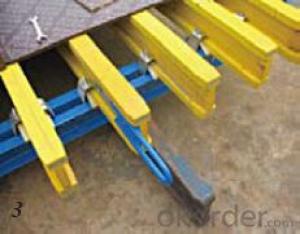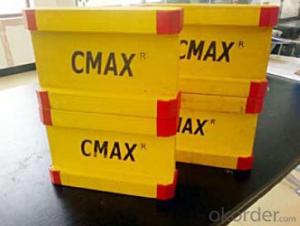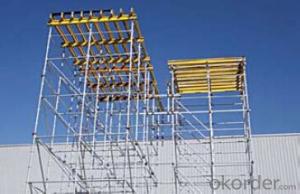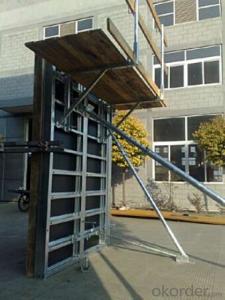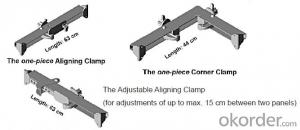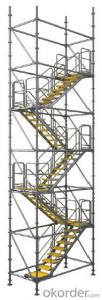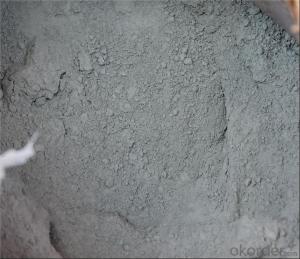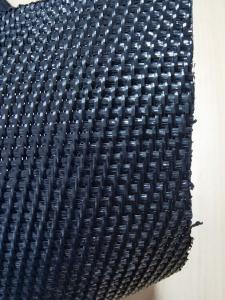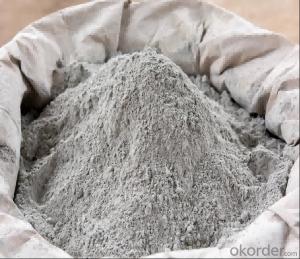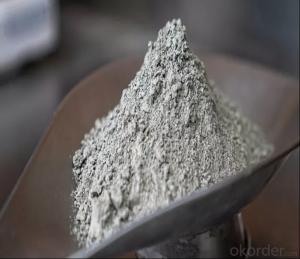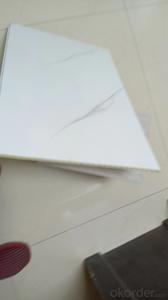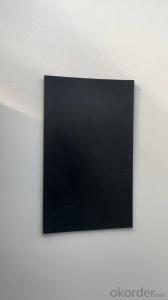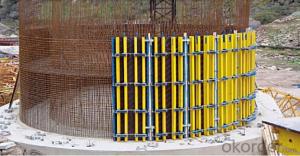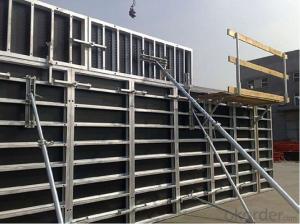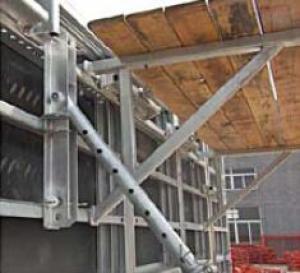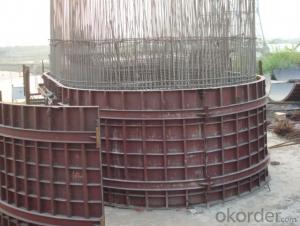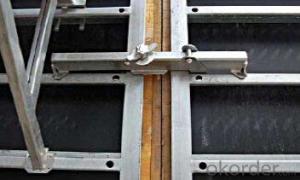Heavy Duty Whole Steel Formwork for Bridge Construction
- Loading Port:
- Tianjin
- Payment Terms:
- TT or LC
- Min Order Qty:
- 300 m
- Supply Capability:
- 100000 m/month
OKorder Service Pledge
OKorder Financial Service
You Might Also Like
1. Structure of Heavy Duty Whole Steel Formwork
A compositional steel formwork system mainly used in the building which has regular structure without beams, the excellent formwork system can make the integral pouring for the wall & slab easily achieved.
2. Main Features of Heavy Duty Whole Steel Formwork
◆ High stiffness, make perfect shape for concrete.
◆ Easy operation, save labor and force.
◆ Fast forming, repeatedly turnover.
◆ No assembling, easy operation with formed formwork.
◆ High stiffness, make perfect shape for concrete.
◆ Repeatedly turnover is available.
◆ Widely applied range, such as building, bridge, tunnel, etc.
3. Heavy Duty Whole Steel Formwork images
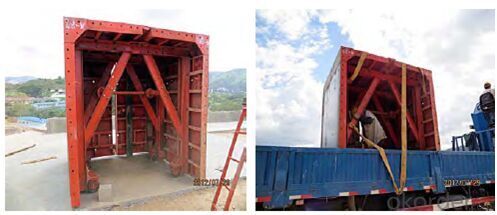
4. Heavy Duty Whole Steel Formwork Specifications
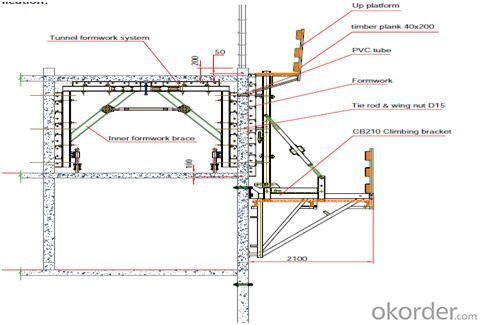
5. FAQ of Heavy Duty Whole Steel Formwork
1) What can we do for you?
.We can ensure the quality of the Heavy Duty Whole Steel Formwork and avoid extra expenses for customers.
.We can provide you the professional technical team.
.We can provide professional building proposal for your projects.
2) What promises can be done by us?
. please feel free to write us for any QUOTE.
. If need any technical and building assistance, we could provide on-site professional staff for instruction.
. Please DO check goods when courier knocks your door and contact us asap if any issues.
3) What about of our after-sale services?
. Response will be carried out in 24hours after receiving any complain or request.
. Any formwork cost can be refund after order is confirmed.
. If the products are not based on the requirements, there will be the relevant compensations made for you.
4) What about the package and shipping time?
.Packing: wood package and adhesive tape
.Shipping: by sea
Shipping time: Normally small orders, it just1week business days to arrive your hand; When comes to the customs declaration, it may need 2weeks.
- Q:How does steel formwork handle reinforcement placement?
- Steel formwork is a versatile and popular option in construction because of its strength, durability, and efficient reinforcement placement. When it comes to handling reinforcement placement, steel formwork offers multiple advantages. To begin with, steel formwork provides a sturdy structure that can withstand the weight and pressure of reinforcement bars. This ensures that the bars remain in their desired position during the concrete pouring process, eliminating the risk of deformation or displacement. Consequently, the structural integrity of the final concrete structure is ensured. Moreover, steel formwork comes with pre-determined holes and slots, enabling precise placement of reinforcement bars. These pre-designed openings allow for quick and accurate installation of the bars, reducing the time and effort required for reinforcement placement. Additionally, steel formwork offers the flexibility to adjust the position of the reinforcement bars if necessary, ensuring optimal placement for specific project requirements. Furthermore, steel formwork provides easy access to the reinforcement bars during concrete pouring. Removable panels or openings can be incorporated into the formwork design, allowing construction workers to monitor and adjust the placement of reinforcement bars as needed. This accessibility guarantees proper positioning of the reinforcement, preventing any potential weak areas or structural deficiencies in the concrete structure. Lastly, steel formwork allows for efficient integration of various reinforcement elements, such as steel mesh, rebar cages, or post-tensioning systems. The formwork system can be designed to accommodate these different reinforcement methods, ensuring compatibility and ease of installation. This flexibility in reinforcement placement is particularly advantageous for complex or intricate concrete structures that require specific reinforcement configurations. In conclusion, steel formwork is well-suited to handle reinforcement placement efficiently. Its strength, rigidity, and pre-designed openings enable accurate and secure positioning of reinforcement bars. The accessibility and adaptability of steel formwork further enhance its capability to handle various reinforcement elements, ensuring the integrity and strength of the final concrete structure.
- Q:How does steel formwork handle different concrete slump flow measurements?
- Steel formwork offers versatility and durability when dealing with various measurements of concrete slump flow. Slump flow is a gauge of concrete's consistency and workability, indicating its capacity to flow and fill the formwork. Designed to be rigid and robust, steel formwork can withstand the weight and pressure of poured and cured concrete. This ensures that it effectively contains and supports concrete with different slump flow measurements, preventing any deformation or failure. One advantage of steel formwork lies in its ability to easily adapt to changes in concrete slump flow. It can be adjusted or modified to accommodate varying levels of fluidity and workability. By tightening or loosening the formwork panels, the desired shape and size can be achieved, ensuring proper containment and shaping of the concrete, regardless of its slump flow measurement. Furthermore, steel formwork provides a smooth and uniform surface for the concrete, which is crucial for achieving a high-quality finish. The steel's rigid structure guarantees that the formwork remains in place during the pouring process, minimizing the risk of any movement or displacement that could negatively affect the concrete's performance and appearance. Additionally, steel formwork is resistant to moisture and chemicals, which are often present in concrete mixtures. This resistance ensures that the formwork remains in excellent condition even when exposed to different slump flow measurements, preventing any degradation or corrosion that could compromise its strength and stability. Overall, steel formwork proves to be a dependable and efficient choice for handling different measurements of concrete slump flow. Its strength, adaptability, and resistance to moisture and chemicals make it well-suited for containing and shaping concrete with varying levels of workability, ensuring successful construction projects.
- Q:Can steel formwork be used for both small and large-scale concrete placements?
- Yes, steel formwork can be used for both small and large-scale concrete placements. Steel formwork has high strength and durability, allowing it to withstand the pressure exerted by the concrete during the pouring process. Its versatility and reusability make it suitable for various construction projects, regardless of their size.
- Q:What are the different types of connectors used with steel formwork?
- To ensure stability and proper alignment, steel formwork can utilize various types of connectors. These connectors are designed to securely join the formwork components and establish a reliable connection. 1. Wedge connectors, commonly employed, consist of a wedge-shaped piece that fits into a slot or hole in the formwork. By tightening the wedge, a strong and secure connection is created. Due to their ease of installation and removal, wedge connectors are favored in steel formwork systems. 2. Pin connectors are typically used to connect two formwork panels together. They involve inserting a pin through holes in the formwork panels and securing it with a locking mechanism. Pin connectors are straightforward and effective, providing stability between panels. 3. Bolt connectors are suitable for heavy-duty and permanent connections. These connectors require bolts to be inserted through pre-drilled holes in the formwork components and tightened with nuts. Bolt connectors offer high strength and stability, making them ideal for larger formwork systems or when dealing with heavier loads. 4. Clamp connectors join formwork components by clamping them with a fastening mechanism. These connectors usually consist of metal plates or brackets that are tightened around the formwork components, ensuring a secure connection. Clamp connectors are versatile and can be used in various formwork applications. 5. Magnetic connectors, a newer type of connector, utilize magnets to join formwork components. Typically made of steel, these connectors contain strong magnets that attract to each other, creating a secure connection. Magnetic connectors are easy to install and remove, eliminating the need for additional tools or fasteners. Overall, the choice of connector for steel formwork depends on project-specific requirements, such as formwork system size, complexity, load-bearing capacity, and desired ease of installation and removal. It is crucial to select connectors that are compatible with the formwork components and provide the necessary strength and stability for the construction process.
- Q:How does steel formwork compare to plastic formwork in terms of cost and durability?
- Steel formwork generally tends to be more expensive than plastic formwork due to the higher cost of steel as a material. However, steel formwork offers better durability and longevity compared to plastic formwork. Steel can withstand heavy loads and repetitive use, making it more suitable for large-scale construction projects. While plastic formwork may be more cost-effective for smaller and temporary projects, steel formwork is a more cost-efficient and durable option for long-term use.
- Q:Can steel formwork be used for architectural concrete finishes?
- Yes, steel formwork can be used for architectural concrete finishes. Steel formwork provides excellent strength, durability, and stability, making it suitable for creating intricate and precise architectural designs. It can be used to achieve smooth, textured, or patterned surfaces for architectural concrete finishes, allowing for a wide range of creative possibilities.
- Q:Can steel formwork be used for elevated walkways?
- Yes, steel formwork can be used for elevated walkways. Steel formwork offers high strength, durability, and stability, making it suitable for supporting the weight and load of an elevated walkway. Additionally, steel formwork provides a smooth and level surface, ensuring a safe and stable walking platform for pedestrians.
- Q:Can steel formwork be used for both reinforced and unreinforced concrete structures?
- Yes, steel formwork can be used for both reinforced and unreinforced concrete structures. Steel formwork provides excellent strength and durability, making it suitable for supporting the weight and pressure of both reinforced and unreinforced concrete during the casting and curing process.
- Q:Is steel formwork suitable for projects with tight deadlines?
- Yes, steel formwork is suitable for projects with tight deadlines. Steel formwork is known for its durability and strength, making it capable of withstanding high pressure and repetitive use. This allows for faster construction as it can be reused multiple times without losing its structural integrity. Additionally, steel formwork is easy to assemble and disassemble, enabling quick and efficient installation and removal. Its versatility and adaptability also make it suitable for a wide range of construction projects, regardless of size or complexity. Therefore, using steel formwork in projects with tight deadlines can help expedite the construction process and meet the project timeline.
- Q:Can steel formwork be used for architectural concrete walls?
- Yes, steel formwork can be used for architectural concrete walls. Steel formwork provides a strong and durable framework that can withstand the pressure of wet concrete and result in smooth and precise finishes. It is commonly used for complex shapes and designs in architectural concrete walls as it allows for flexibility and ease of construction.
1. Manufacturer Overview |
|
|---|---|
| Location | |
| Year Established | |
| Annual Output Value | |
| Main Markets | |
| Company Certifications | |
2. Manufacturer Certificates |
|
|---|---|
| a) Certification Name | |
| Range | |
| Reference | |
| Validity Period | |
3. Manufacturer Capability |
|
|---|---|
| a)Trade Capacity | |
| Nearest Port | |
| Export Percentage | |
| No.of Employees in Trade Department | |
| Language Spoken: | |
| b)Factory Information | |
| Factory Size: | |
| No. of Production Lines | |
| Contract Manufacturing | |
| Product Price Range | |
Send your message to us
Heavy Duty Whole Steel Formwork for Bridge Construction
- Loading Port:
- Tianjin
- Payment Terms:
- TT or LC
- Min Order Qty:
- 300 m
- Supply Capability:
- 100000 m/month
OKorder Service Pledge
OKorder Financial Service
Similar products
New products
Hot products
Hot Searches
Related keywords
